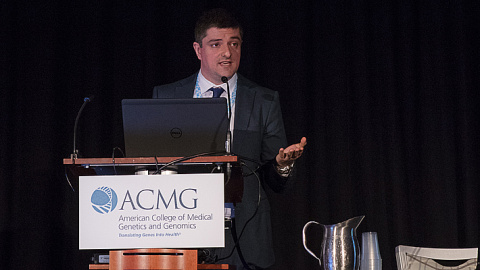
Actionable medical results are often a key component in deciding a patient’s medical management and specialized treatment options. However, some genetic test results can have unclear implications or Variants of Unknown Significance (VUS), which can often affect a clinician’s medical management plans for their patients.
During the 2017 ACMG Annual Meeting in Phoenix, Arizona, Ambry’s Associate Director of the Ambry Translational Genomics Lab, Rachid Karam, MD, PhD, presented the plenary talk “RNA Studies Improve the Classification of Splicing Variants” on Thursday, March 24th at 9:45am to an audience of more than 700 geneticists and genetic counselors. Dr. Karam’s presentation created awareness on Ambry’s Translation Genomics Lab and how the further understanding VUS results can help clinicians and their patients create an actionable medical management plan.
“Ambry has been very proactive as a lab in our quest to understand variants,” said Dr. Karam during his presentation.
As the only commercial lab to offer RNA Studies, The Ambry Translational Genomics Lab (ATG Lab) can provide a complete look at a patient’s alteration, so no one is left without any answer. This lab is dedicated to performing molecular functional assays that provide clarity on whether a VUS is benign or pathogenic and is available to all patients who test at Ambry for no additional cost.
{Read: “RNA Labs—How They Impact The Medical World”}
Dr. Karam presented a summary of the RNA Studies results of all patient alterations that were tested at the ATG Lab to date. The data demonstrates that RNA studies have significantly improved reclassification rates and, more importantly, reduced the classification of splicing VUS by approximately 90 percent.
This brings clarity to test results and helps medical providers better manage their patients. For example, if a VUS is found to be pathogenic, clinicians and their patients can explore preventative surgeries or aggressive screening regimes.
Dr. Karam also discussed the validation and implementation of RNA Studies offered by Ambry, which incorporated gold-standard techniques such as gel analysis and Cloning-Sanger to Next-generation sequencing (NGS).
“The summary of the data is used as evidence to stablish if a variant is pathogenic,” said Dr. Karam. “RNA studies works with cardio, neuro or cancer genes. RNA can reclassify 80 percent of variants and has a tremendous impact on reducing VUS.”
By understanding a patient’s VUS test result, a clinician can further clarify their patient’s medical management strategy.
The ATG Lab is also a part of Ambry’s Family/RNA Studies program, which helps to clarify the clinical implications of VUS found in patients by testing additional family members. By identifying splicing VUS in family members, this additional service can help clinicians decide the best medical management for their patient’s family members

Dr. Karam will provide more details about the ATG Lab and RNA Studies during a webinar presentation hosted by Ambry “What does one do with those pesky VUS? Ambry’s Translational Genomics Lab brings new understanding to VUS” on April 12th from 10:00-11:00am. This webinar will also be available for Continuing Education Units.
Register here and stay tuned to Ambry’s social media and corporate blog for more updates.



